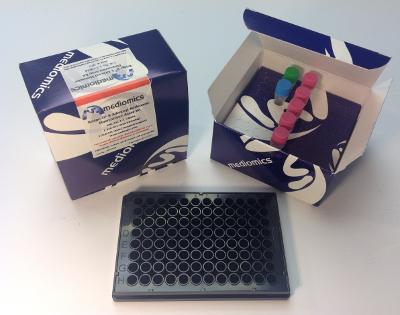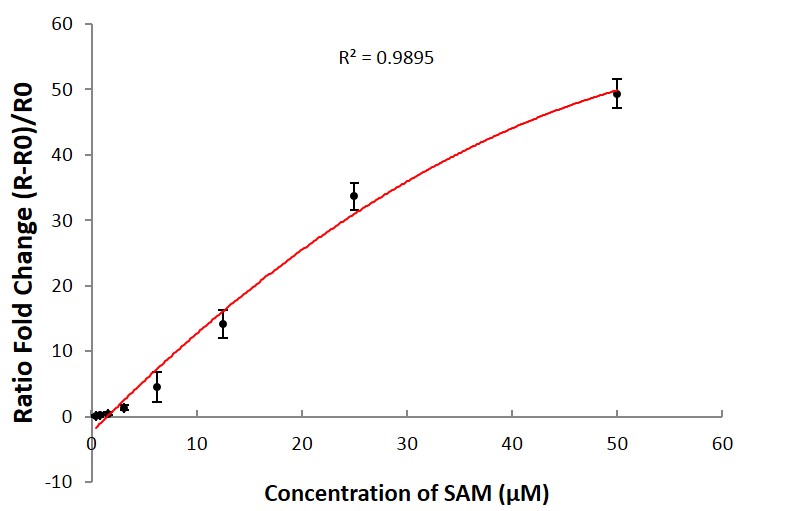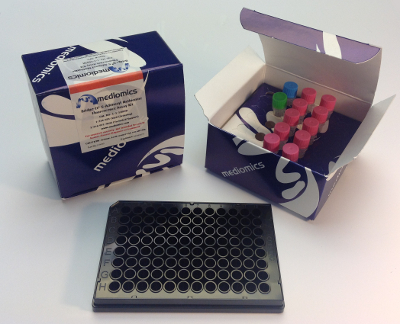TR-FRET Bridge-It® S-Adenosyl Methionine (SAM) Fluorescence Assay Kit, 96-well format
S-adenosyl methionine (also referred to as SAM, SAMe or AdoMet) plays a crucial role in the biological process of methylation in all types of organisms. In the methylation cycle, SAM serves as the donor of the methyl group used in the covalent modification of DNA and proteins.
The Bridge-It® SAM fluorescence assay method exhibits highly desirable performance characteristics including a high (>5:1) signal to background (S/B) ratio, a broad linear dynamic range (0.5 µM – 20 µM), and, a detection sensitivity of 0.5 µM. This detection level (0.5 µM) is useful for quantifying SAM in most test samples of interest including biological fluids, cell culture and fermentation medium, and extracts of tissues and cells.
$220.00 – $400.00
Description
TR-FRET Bridge-It® S-Adenosyl Methionine (SAM) Fluorescence Assay Kit, 96-well format
Application:
-
Quantification of SAM level in biological fluids, cell culture and fermentation medium, and extracts of tissues and cells
-
Epigenetics and methylation studies
-
Numerous neurological and psychiatric disorders including Alzheimer’s disease, depression, HIV-related neurological dysfunction/dementia, multiple sclerosis, Parkinson’s disease, spinal cord degeneration, epilepsy, fibromyalgia, migraine headaches, and also chronic liver dysfunction, arteriosclerosis and cancer
Features:
-
Easy: Mix test sample or standard with the Assay solution and incubate at ~25°C
-
Fast: Read fluorescent signal after 30 minutes of incubation
-
Sensitive: Assay measures SAM at a lower limit of sensitivity of 0.5 µM (i.e. 50 pmol / well in a 96-well or 20 pmol in a 384-well black microplate)
-
Flexible: Assay is available in FRET and TR-FRET format, and can also be adapted to colorimetric format.
-
High Signal to Background Ratio: TR-FRET option of the Bridge-It® Assay kit gives very high signal to background ratio (50+ fold) which is useful for high throughput screening and drug discovery
S-Adenosyl Methionine
S-adenosyl methionine (also referred to as SAM, SAMe or AdoMet) plays a crucial role in the biological process of methylation in all types of organisms. In the methylation cycle, SAM serves as the donor of the methyl group used in the covalent modification of DNA and proteins. Variability in SAM levels has been linked to the processes of aging, numerous neurological and psychiatric disorders including Alzheimer’s disease, depression, HIV-related neurological dysfunction/dementia, multiple sclerosis, Parkinson’s disease, spinal cord degeneration, epilepsy, fibromyalgia, migraine headaches, and also chronic liver dysfunction, arteriosclerosis and cancer. Currently, SAM is quantified using the high pressure liquid chromatography (HPLC) method. HPLC is time consuming, costly and, due to the large amount of organic solvent required, not environmentally friendly.
Bridge-It® S-Adenosyl Methionine Fluorescence (SAM) Assay1,2
Mediomics Bridge-It® S-adenosyl methionine (SAM) fluorescence assay method is based on a combination of well-established fluorescence measurement techniques and our patented new assay platform design that utilizes DNA-binding proteins as biosensors for their respective small molecule co-regulators (ligands). The affinity of the DNA sequence-specific MetJ protein for its unique DNA-binding site is greatly increased in the presence of its ligand, S-adenosyl methionine. For this assay, the MetJ consensus sequence was split into two DNA “half-sites”. One half fragment was labeled with Eu3+ and the other half fragment was labeled with Oyster® 645 fluorophore3,4. The relative amount of SAM present in a test sample will influence the amount of DNA-MetJ protein complex formation in the assay. When this complex forms, it brings the fluorescence labeled-DNA half-sites into close proximity and causes a measurable change (increase) in fluorescence signal emission that can be readily measured using a microplate reader (wavelength settings: absorption 330 nm; emission 665 nm). SAM concentrations in test samples are then determined using a SAM standard curve. The Bridge-It® SAM fluorescence assay method exhibits highly desirable performance characteristics including a high (>50:1) signal to background (S/B) ratio, a broad dynamic range (0.5 µM – 50 µM), and, a detection sensitivity of 0.5 µM. This detection level (0.5 µM) is useful for quantifying SAM in most test samples of interest including biological fluids, cell culture and fermentation medium, and extracts of tissues and cells.
In contrast to the HPLC procedure, the Bridge-It® SAM fluorescence assay method utilizes the 384 and 96-well microplate format. Thus, it is ideally suited for the rapid, simultaneous measurement of SAM levels in large numbers of test samples. Also, this method is readily adaptable to the high-throughput screening platforms currently being used in drug discovery research.
The Bridge-It® S-adenosyl Methionine fluorescence assay method exhibits highly desirable performance characteristics including a high signal to background (S/B) ratio, a good linear dynamic range, and a limit of detection of ~0.5 μM. The total assay time is 30 minutes.
Pricing: The 50-well kit is a one-time trial purchase. For bulk pricing options, please contact us. For any other questions or comments, please do not hesitate to contact us. We are always happy to help!
For information on the assay principle please see the TR-FRET Bridge-It® Assay Technology Platform page or download the protocol. This product is protected by patents and pending patents.
References for Mediomics’ Bridge-It SAM Fluorescence Assay Kit
-
Increased Serine and One-Carbon Pathway Metabolism by PKCλ/ι Deficiency Promotes Neuroendocrine Prostate Cancer. Reina-Campos M, Linares JF, Duran A, Cordes T, L’Hermitte A, Badur MG, Bhangoo MS, Thorson PK, Richards A, Rooslid T, Garcia-Olmo DC, Nam-Cha SY, Salinas-Sanchez AS, Eng K, Beltran H, Scott DA, Metallo CM, Moscat J, Diaz-Meco MT. Cancer Cell. 2019 Mar 18;35(3):385-400.e9. doi: 10.1016/j.ccell.2019.01.018. Epub 2019 Feb 28.
-
Mitochondrial stress triggers a pro-survival response through epigenetic modifications of nuclear DNA. Mayorga L, Salassa BN, Marzese DM, Loos MA, Eiroa HD, Lubieniecki F, García Samartino C, Romano PS, Roqué M. Cell Mol Life Sci. 2019 Apr;76(7):1397-1417. doi: 10.1007/s00018-019-03008-5. Epub 2019 Jan 23.
-
PLZF targets developmental enhancers for activation during osteogenic differentiation of human mesenchymal stem cells. Agrawal Singh S, Lerdrup M, Gomes AR, van de Werken HJ, Vilstrup Johansen J, Andersson R, Sandelin A, Helin K, Hansen K. Elife. 2019 Jan 23;8. pii: e40364. doi: 10.7554/eLife.40364.
-
Genes controlling the activation of natural killer lymphocytes are epigenetically remodeled in intestinal cells from germ-free mice. Poupeau A, Garde C, Sulek K, Citirikkaya K, Treebak JT, Arumugam M, Simar D, Olofsson LE, Bäckhed F, Barrès R. FASEB J. 2019 Feb;33(2):2719-2731. doi: 10.1096/fj.201800787R. Epub 2018 Oct 10.
-
MPTAC Determines APP Fragmentation via Sensing Sulfur Amino Acid Catabolism. Suganuma T, Swanson SK, Gogol M, Garrett TJ, Conkright-Fincham J, Florens L, Washburn MP, Workman JL. Cell Rep. 2018 Aug 7;24(6):1585-1596. doi: 10.1016/j.celrep.2018.07.013.
-
C. elegans MRP-5 Exports Vitamin B12 from Mother to Offspring to Support Embryonic Development. Na H, Ponomarova O, Giese GE, Walhout AJM. Cell Rep. 2018 Mar 20;22(12):3126-3133. doi: 10.1016/j.celrep.2018.02.100.
-
Bridge- It® is a registered trademark of Mediomics, LLC, St. Louis, Missouri, U.S.A. Mediomics has a worldwide, exclusive license for this assay platform from Saint Louis University, St. Louis, Missouri.
-
The Bridge-It® S-adenosyl methionine (SAM) fluorescence assay kit is provided for laboratory R&D use only. This product is not approved by the U.S. Government or by the government of any other country of the world for use in clinical diagnosis of disease or treatment of disease in humans or animals.
-
Oyster® is a registered trademark of Denovo Biolabels, GmbH, Munster, Germany.
-
Flownamics® Analytical Instruments, Inc., Madison, Wisconsin, is the authorized U.S. distributor of Oyster® dyes.





